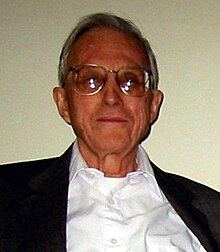Arthur W. Burks
Arthur Walter Burks (born October 13, 1915 in Duluth , Minnesota , † May 14, 2008 in Ann Arbor , Michigan ) was an American mathematician and computer scientist . In the 1940s he was involved in the development of the Electronic Numerical Integrator and Calculator ( ENIAC ), the first purely electronic digital universal computer.
Life
Burks acquired 1936 its Bachelor diplomas in mathematics and physics at the University of Greencastle and the Master - (1937) and doctorate (1941) in philosophy at the University of Michigan . After finishing his studies in Michigan, Burks moved to Philadelphia and enrolled at the Moore School of Electrical Engineering . Together with his fellow student John Presper Eckert , he designed a concept for an electronic digital universal computer, the ENIAC, which was financed by the U.S. Army from June 1943 . Burk's contribution included designing the multiplier unit . In the same year he married Alice Rowe, who was employed at the Moore School.
In 1946, Burks was appointed by John von Neumann to the Institute for Advanced Study in Princeton . He later returned to Ann Arbor, where he was appointed professor of philosophy at the University of Michigan and co-founded the computer engineering department. Burks was also chairman of the Charles S. Peirce Society between 1954 and 1955 .
In the 1960s, he acquired four assemblies of the original ENIAC that had been standing around in a storage room and had already started rusting. He restored them and donated them to the University of Michigan, where they are still on display today at the entrance to the computer technology department building.
Up until the 1980s, Burks and his wife wrote various articles about the ENIAC and a book about the Atanasoff-Berry computer . In 1990 he donated some of his documents to the university archive.
Burks died in a nursing home in May 2008 as a result of his Alzheimer's disease.
| personal data | |
|---|---|
| SURNAME | Burks, Arthur W. |
| ALTERNATIVE NAMES | Burks, Arthur Walter |
| BRIEF DESCRIPTION | American computer pioneer |
| DATE OF BIRTH | October 13, 1915 |
| PLACE OF BIRTH | Duluth , Minnesota |
| DATE OF DEATH | May 14, 2008 |
| Place of death | Ann Arbor , Michigan |
